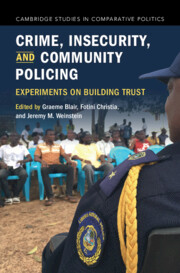
-
Select format
-
- Publisher:
- Cambridge University Press
- Publication date:
- 09 December 2024
- 05 December 2024
- ISBN:
- 9781009235914
- 9781009235884
- 9781009235877
- Dimensions:
- (229 x 152 mm)
- Weight & Pages:
- 0.97kg, 588 Pages
- Dimensions:
- (229 x 152 mm)
- Weight & Pages:
- 0.82kg, 588 Pages
You may already have access via personal or institutional login
Book description
How can societies effectively reduce crime without exacerbating adversarial relationships between the police and citizens? In recent decades, perhaps the most celebrated innovation in police reform has been the introduction of community policing, where citizens are involved in building channels of dialogue and improving police-citizen collaboration. Despite the widespread adoption of community policing in the United States and increasingly in the developing world, there is still limited credible evidence about whether it realistically increases trust in the police or reduces crime. Through simultaneously coordinated field experiments in a diversity of political contexts, this book presents the outcome of a major research initiative into the efficacy of community policing. Scholars from around the world uncover whether, and under what conditions, this highly influential strategy for tackling crime and insecurity is effective. With its highly innovative approach to cumulative learning, this project represents a new frontier in the study of police reform.
Reviews
‘Blair and colleagues ask the fundamental and difficult questions about evidence-based approaches to community policing in their work: Can it reduce crime and improve police legitimacy, and in what contexts? This volume is an essential guide for researchers and donor nations trying to test and implement community policing in the Global South (the focus of the book) and the Global North, which faces the same questions.’
Cynthia Lum - Distinguished University Professor of Criminology and Director of the Center for Evidence-Based Crime Policy, George Mason University
‘A must-read for those who think that community policing is the key to effective police reform. This ambitious study involves a set of comparable experiments across six countries in the Global South. In arguably the most rigorous study of community policing to date, the editors and contributors find no impact across the large number of outcomes that they consider. Although future research will be needed to understand exactly why these efforts fail in the Global South, this result raises important questions about the efficacy and replicability of this widely celebrated approach to police reform.’
Christopher Winship - Diker–Tishman Professor of Sociology, Harvard University
‘Community policing has been a popular strategy, aiming to combat crime while strengthening relations between citizens and states. Crime, Insecurity, and Community Policing reports on an extraordinary collection of collaborations between researchers and police forces that put these ideas to the test in 700 neighborhoods across 6 countries. Across research teams, across contexts, and for a wide range of behavioral and attitudinal measures, the findings show no support for the promised benefits of a switch to community policing. Rigorous and reflective, this book serves as a wake-up call to practitioners seeking to transplant policing models across contexts without also engaging with the underlying incentives facing police agencies.’
Macartan Humphreys - Director of the Institutions and Political Inequality group at the WZB Berlin Social Science Center and Honorary Professor of Social Sciences at Trinity College Dublin and Humboldt University of Berlin
Contents
Metrics
Altmetric attention score
Full text views
Full text views help Loading metrics...
Loading metrics...
* Views captured on Cambridge Core between #date#. This data will be updated every 24 hours.
Usage data cannot currently be displayed.
Accessibility standard: Unknown
Why this information is here
This section outlines the accessibility features of this content - including support for screen readers, full keyboard navigation and high-contrast display options. This may not be relevant for you.
Accessibility Information
Accessibility compliance for the PDF of this book is currently unknown and may be updated in the future.

